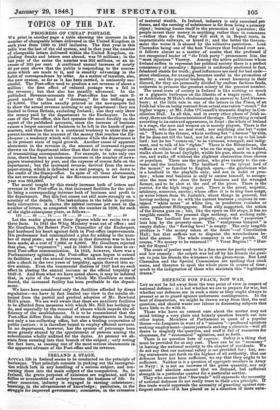IRELAND A STAGE.
ACTUAL life in Ireland seems to be conducted on the principle of burlesque. That principle consists in picking out the incongrui- ties which lurk in any handling of a serious subject, and con- verting them into the main subject of the composition. So, in Ireland, the grave purposes of existence are neglected, and the follies or counterfeits of society become the business of life. In other countries, industry is engaged in earning. subsistence ; learning, in the advancement of knowledge ; patriotism, in the struggle for improved government ; commerce, in the extension of material wealth. In Ireland, industry is only exercised pro forma, and the earning of subsistence is far from being a primary object ; learning busies itself in the promotion of ignorance; the people invest their money in anything rather than in commerce —rather than do that, they will sink it in Repeal rents, in impracticable railways, or hoard it ; and the better the Govern- ment the worse it is abused by the collective patriotism. Lord Clarendon being one of the best Viceroys that Ireland ever saw, it follows almost as a matter of course that the professed if not recognized leader of "the Irish party " pronounces him the "most injurious" Viceroy. Among the active politicians whom Ireland suffers to represent her political society there is a perfect consistency of unreality : figment is uniformly preferred to fact, falsehood stands for truth; good influences are used for bad ends— pious obedience, for example, becomes useful in the promotion of murder; and the popular leaders, by a sweet harmony in their discord, for they are personally divided by endless factious feuds, cooperate to promote the greatest misery of the greatest number.
The usual state of society in Ireland is like nothing so much as a gigantic burlesque on the libretto of a tragic opera. Look at Archbishop M`Hale's rbodomontade in answer to Lord Shrews- bury ; at the little tale in one of the letters in the Times, of an Irish lad who on being rescued from actual starvation " struck " for higher wages ; at Mr. John O'Connell's dramatic display in Con- ciliation Hall. In all this, and in every other phase of Irish so- ciety, there are the characteristics of the stage. Everything is valued according to its outward appearance, in front : the whole of Ireland is a stage, the men and women on it merely players. There is the labourer, who does no real work, nor anything else but "come on." There is the farmer, who is nothing but " a farmer" by title, for he does not till the land, nor let it, nor give it up to his land- lord : but he too "comes on," to be virtuous, wronged, and indig- nant, and to talk of his " rights." There is the Ribandman the ruffian or villain of the piece ; who on the stage and in Ireland,
stalks about in broad daylight, wields his gun, shoots on a given cue, and walks off without the slightest obstruction from chorus or populace. There are the police, who give variety to the cos- tume and the incidents. The landlord is "the tyrant lord of the manor," so familiar to English opera,—the gentleman who is a landlord in the playbills only, and not in habit or prac- tice ; whose real business is only to amuse himself, to antago- nize the man who does the heavy business and the wronged farmer, and to be shot at the end of the piece. There is the patriot, for the high tragic part. There is the priest, majestic, arbitrary, sonorous, ascetic ; whose office it is to sing bass songs, or write letters from St. Jarlath's, about things in general, but having nothing to do with the current business ; copious in sus- tained " white notes" or white lies, in ponderous roulades or more ponderous Billingsgate. Most ably supported, the action of the drama goes on ; but, like the opera on the stage, it has no tangible results. The peasant digs nothing, and nothing culti- vates. The landlord has no property, except the " properties" lent him by the property-man. The " sumptuous banquet" is empty dishes ; the flowing bowl" is empty. The only tangible
produce is " the money taken at the doors"—of Conciliation Hall ; but that suffices not to disguise the wretchedness be-
hind the scenes. The whole company is on the parish. Of course, " No money to be returned ! ' Vivat Regina!" "Hur- rah for Repeal ! "
The court of justice used to be a fine scene for poetic eloquence and low comedy : the culprit was led off by his friends the gaol- ers to join his friends the witnesses in the green-room. But Lord Clarendon and the Special Commission are spoiling that stock scene, and threaten to spoil the whole piece in course of time ; much to the indignation of those who maintain this "legitimate drama."






















 Previous page
Previous page